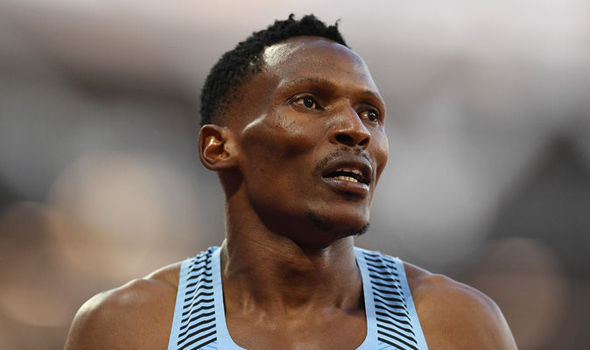Athletics' governing body has defended its decision to deny a World Championship medal favourite entry to London Stadium amid attempts to control a "very virulent" norovirus outbreak.
Botswana's Isaac Makwala, 30, had hoped to run in Tuesday's 400m final, but was barred from competing.
His country's Olympic boss, Falcon Sedimo, said that was "disturbing".
But the IAAF said it was under instruction to quarantine athletes who showed symptoms of the virus.
It acknowledged Makwala's absence was "a sad case" but said its medical staff examined the athlete and notes taken by a doctor showed he had been vomiting over an 18-hour period.
Pam Venning, head of medical at the IAAF, told BBC Sport: "I have to trust my doctors. My role is to ensure the healthcare of all the athletes here and it's a very infectious and very virulent disease."
In a later statement, the governing body said: "The team doctor, team leader and team physio had been informed following the medical examination that the athlete should be quarantined for 48 hours and would therefore be missing the 400m final on Tuesday."
Venning said "all the other teams" with affected athletes had adhered to IAAF instructions.
Makwala had been considered the main threat to Olympic champion and world record holder Wayde van Niekerk, who retained his world title by winning Tuesday's race.
The Botswanan earlier told BBC Sport he would be 'devastated' to miss out as he was fit to race - having already been withdrawn from Monday's 200m heats.
Public Health England says 30 athletes and support staff have been affected by sickness at the Tower Hotel in London - though the hotel is not the source of the outbreak.
The IAAF has insisted it gave clear communication to the Botswana delegation that Makwala would not be allowed to run following a medical examination.
But Botswana officials said they had received no explanation as to why Makwala was not allowed entry, and had not been told to keep the runner in quarantine.
Sedimo told BBC Sport: "There has been no official communication, no formal communication from the IAAF at all. We found out from the media that he could not take part and he is heartbroken.
"There have been no medical tests at all, it's just generalised assumptions because of the outbreak of sickness and he has just one of those symptoms."
Botswana medical team member Simon O'Brien said Makwala showed no symptoms of the bug and blamed "poor communication" from the IAAF for the athlete missing the race.
"He's fit, he's very well, he's prepared to run, and he's just being kept away by the IAAF," said O'Brien, who insisted there was no sign of the illness during the time he spent with Makwala.
Some athletes have questioned the decision.
After winning gold, Van Niekerk said: "I would love him to have his fair opportunity. I believe he would have done very very well. I've got so much sympathy. I really wish I could give him my medal."
British former 400m runner Dai Greene tweeted: "I was really ill in the build-up [to the 2010 Commonwealth Games] in Delhi as were so many others. But nobody stopped us racing or tested us."
BBC commentator Allison Curbishley, another former 400m runner, defended the IAAF's decision to bar Makwala from competing, but described its handling of the situation as "a real mess".
"When he presented himself as being ill, of course the IAAF had to go to their protocols. Illness had already been an issue as of the Sunday, so they were clearly on edge and didn't want it to spread," she told BBC Sport.
"The whole thing comes down to communication. The IAAF did not handle it brilliantly, and if the situation arose again I think it would be dealt with very differently.
"As athletics fans we were robbed of a great head-to-head, and what we might see happen now is if an athlete has the same symptoms later this week they may well keep it quiet."
Several German and Canadian athletes staying at the Tower Hotel fell ill last week.
A further 30 Germans due to arrive on Tuesday were moved to other hotels.
German triple jumper Neele Eckhardt collapsed but was well enough to compete on Saturday, and took part in Monday's final.
The Ireland team, who are also staying at the hotel, have confirmed that one athlete - 400m hurdler Thomas Barr -has been affected.
The Tower Hotel said investigations conducted with environmental health officers and the IAAF had shown the hotel was "not the source of the illness". That has also been confirmed by Public Health England.
The IAAF may soon realise they have got this horribly wrong as to why they have chosen to disqualify Makwala. Does this apply to other athletes? If you collapse, you are OK but if you vomit you aren't OK? There is a lot of inconsistency here.
And then of course, there is the elephant in the room - Wayde van Niekerk's only challenger has been pulled out of both the 200m and 400m. The conspiracy theories will come out of the silence.
Stomach bugs that cause diarrhoea and vomiting are very common and easy to catch. You can get them from eating contaminated food or through contact with people who have got gastroenteritis.
If that infected person doesn't wash their hands before handling your food or touching objects and surfaces that you then touch, there's a good chance you could get sick too.
A person with gastroenteritis is most infectious from when their symptoms start until a couple of days after all their symptoms have gone.
But when he attempted to pass through the athletes' entrance to the stadium, an official and security personnel prevented him doing so.
Credit: BBC Sports





